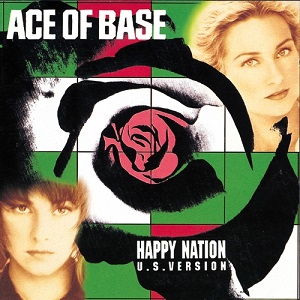Headphoning It In: Living In A “Happy Nation”

October 4, 2019
1993: Twenty-six years ago, a Swedish pop quartet, comprised of two females and two males that isn’t ABBA, released their monumental debut album, Happy Nation. On my very birthday, September 25th, Ace of Base graced humankind with a, dare I say, life-changing auditory experience. Note, there are three versions of Happy Nation in existence, but the only one worthy of discussion is Happy Nation (U.S. Version). As a nine-year-old, I never expected for one of the many albums downloaded onto my parents’ 4th Generation iPod Nano to alter my taste in music forevermore.
Allow me to break down a handful of iconic tracks:
The title track “Happy Nation” is one of my all-time favorite songs. Ever. Granted, (almost) every song on the album is straight fire, but “Happy Nation” is a timeless example of a daring take on ’90s pop. Each Ace of Base song has such a fascinating, unique introduction – the track opens with a haunting chord progression, then the bass joins in, then the tambourine, then the alternating flute pattern, then a choir echoes a melancholic verse in Latin – all of which amounts to a minute-long buildup. But entirely worth the wait, no doubt. With a memorable chorus, and even more memorable lyrics, “Happy Nation” is an introspective social commentary disguised as a synth-driven spectacle. Absolute chills when the synth madhouse is cut and vocalist Jenny Berggren’s haunting voice echoes: “A man will die, but not his ideas.”
“Don’t Turn Around,” a cover of Aswad’s cover of Luther Ingram’s cover of Tina Turner’s original song, is a reggae-inspired synth fest. A whispered, bubbling introduction begins with a single line, “I will survive, without you,” before a stark tonal shift to punchy synths and harmonized vocalizing. The repetitive yet memorable structure tells the story of a lost lover, haunted by denial and separation. The chorus begs to be screamed, naturally at the top of your lungs, as if reenacting an overdramatic rom-com montage.
A mournful trumpet opens up “Living in Danger,” joined by an overlapping whistled melody. A faint rap (or is it a prophetic warning?) leads into the first verse and sets the tone for the rest of the song. To my untrained ear, “Living in Danger” has more Eastern influences and tonalities, making it arguably the album’s most unique record, compared to the standard 90s pop anthem. This track is just so strong, so powerful, so commanding, so gripping – you get the gist of it. It’s perhaps my most played off Happy Nation, and the one I would recommend first to new listeners.
It’s synths galore. It’s harmony central. It’s got bells and whistles and bongos. It deals with paternal relations in connection to a complicated, all-encompassing, faithless love. Quite frankly, that’s entirely speculation, because these lyrics are by far the most confusing and all-around strange. But no other song is going to make you question: what are you going to tell your daddy? And no other song is named after my favorite nightly game show, “Wheel of Fortune.” Need I say more?
“Giving It Up (Ace Version)” is the entire reason Happy Nation (U.S. Version) is Happy Nation’s most superior form; the other two releases do not have this sublime bonus track. This minor-key dance hit has that familiar mix of sadness and confidence that’s present when you truly give up on someone. “Giving It Up” is a ’90s pop ballad, equipped with overdramatic vocalization and harmonies. It’s all around rooted in the decade, with a heavy drum-synth combination, as well as the most ’90s lyrics of all time, “surfing in the cyber.” In my unpopular opinion, “Giving It Up” is the catchiest record off Happy Nation and a real hidden gem that deserved more than mere bonus track status.
I would be remiss not to mention the tragedy that is Ace of Base’s most recognizable hit, “The Sign.” It isn’t even the worst song on Happy Nation, yet, much like most creative endeavors that have had the life sucked out of them by the mainstream, “The Sign” has gone too commercial to be enjoyed. Imagine my surprise when I was forced to watch Pitch Perfect, also known as one of the worst movies of all time. The whole plot revolves around the protagonist influencing an acapella group to abandon their routine, where they sing “The Sign,” in order to reach success within the film. This narrative, this slander of an Ace of Base classic, is not one I can get behind. Their acapella cover, itself, is deplorable – flat and monotone and not taking advantage of a song with so much range (the hi-hats, the octave shift, the catchy bridge, ugh!) I will never forgive the mainstream for securing Ace of Base’s commercial legacy as having that song whose Pitch Perfect cover is one of the most popular tracks on Tik Tok, a video app that is the diseased underbelly of social media’s infectious existence. So much for Swedish pop-rock musicals and beautiful romantic comedies set on a quaint Greek island.
The age-old question remains: why was Ace of Base never solidified as champions of ’90s pop and why are they usually excluded from the conversation on the genre altogether? My theory is that Ace of Base embodied the ’90s sound a little too much and that their auditory pop aesthetic was a little too dependent on the synthesizer (this is already my seventh synths mention). I clearly love Swedish pop and absolutely adore ABBA, but Ace of Base undoubtedly deserves respect in the same vein. Best case scenario, the recent resurgence of ’90s trends and cultures allows for Ace of Base to catapult back into the public eye. With an experience like Happy Nation, that has an opening track as alluring as “All That She Wants,” we should not let Ace of Base be immortalized as a second-best ABBA.














